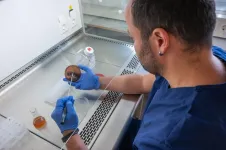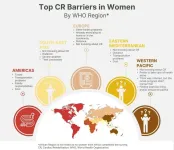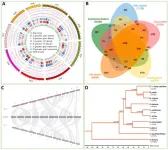(Press-News.org) Tiny waterfleas could play a pivotal role in removing persistent chemical pollutants from wastewater – making it safe to use in factories, farms and homes, a new study reveals.
Rapid urbanisation, population growth, unsustainable food production and climate change have put unprecedented pressure on water resources, culminating in a global water crisis. The sustainable management and reuse of water resources is paramount for ensuring societal, economic, and environmental well-being.
Persistent chemical pollutants, originating from domestic and industrial processes, escape conventional wastewater treatment and prevent its safe reuse. When wastewater effluent is released into rivers, it eventually finds its way into reservoirs, irrigation systems, and aquifer recharges. These chemical pollutants then enter the human food chain and water supply, detrimentally impacting the health of approximately 92 million individuals annually.
Scientists and engineers have discovered a method to harness Daphnia to provide a scalable low-cost, low-carbon way of removing pharmaceuticals, pesticides, and industrial chemicals from wastewater. This approach avoids the toxic byproducts typically associated with current technologies.
The researchers have developed technology that allows them to retrofit populations of waterfleas into wastewater treatment plants. What makes their technology unique is the selection of strains based on their chemical tolerance which the researchers ‘resurrect’ from past environments.
Their findings set to be published today (25/09/2023) in Science of the Total Environment, showcase an international team of researchers led by the University of Birmingham. They demonstrate the removal efficiency of four carefully selected strains of water flea on diclofenac (pharmaceutical), atrazine (pesticide), arsenic (heavy metal), and PFOS (industrial chemical).
Senior author Professor Luisa Orsini, from the University of Birmingham, commented: “Our profound understanding of water flea biology enabled us to pioneer a nature-inspired tertiary wastewater treatment technology. This refines municipal wastewater effluent and safeguards the ecological health of our rivers.
“The water flea's remarkable ability to remain dormant for centuries allows scientists to revive dormant populations that endured varying historical pollution pressures. Leveraging this trait, researchers sourced strains with diverse tolerances to chemical pollutants, incorporating them into the technology.”
Co-author Dr Mohamed Abdallah, from the University of Birmingham, commented: “Our technology could improve the quality of wastewater effluent - meeting current and upcoming regulatory requirements to produce reusable water suitable for irrigation, industrial applications, and household use. By preventing persistent chemicals from entering waterways, we can also prevent environmental pollution.”
Co-author Professor Karl Dearn, also from the School of Engineering, University of Birmingham, commented: “We introduced these remarkable water fleas into custom containment devices to refine effluent before its final release. Once in place, our technology largely maintains itself, attributed to the water fleas' clonal reproduction capability.”
Lead author and University of Birmingham PhD student Muhammad Abdullahi added: “This novel nature-inspired technology provides a potentially revolutionary process for sustainably removing persistent chemical pollutants from wastewater. By preventing these chemicals from being discharged, we can protect our environment and biodiversity.”
ENDS
For media enquiries, an embargoed copy of the research paper or interviews please contact Tony Moran, Press Office, University of Birmingham: +44 (0)7827 832312, e-mail: t.moran@bham.ac.uk or pressoffice@contacts.bham.ac.uk
Notes to editor:
The University of Birmingham is ranked amongst the world’s top 100 institutions. Its work brings people from across the world to Birmingham, including researchers, teachers and more than 8,000 international students from over 150 countries.
‘Harnessing water fleas for water reclamation: a nature-based tertiary wastewater
treatment technology’ - Muhammad Abdullahi, Iestyn Stead, Sophie Bennett, Rafael Orozco, Mohamed Abou-Elwafa Abdallah, Sara Jabbari,, Lynne E. Macaskie, Alexandra Tzella, Stefan Krause, Bushra Al-Duri, Robert G. Lee, Ben Herbert, Peter Thompson, Megan Schalkwyk, Samuel Getahun, Karl D Dearn, and Luisa Orsini is published in Science of the Total Environment.
Participating institutions include: University of Birmingham, UK; University of Lyon, France; Daphne Water Solutions, Birmingham, UK; Stopford Ltd – Technology and Innovation Service Group, Knutsford, UK; Umgeni Water Amanzi, South Africa; and The Alan Turing Institute, British Library, London, UK. END
Waterfleas hold key to cleaner environment and better human health
2023-09-25
ELSE PRESS RELEASES FROM THIS DATE:
Researchers pioneer safe chemotherapy methods for treating bacterial infections
2023-09-25
Antibiotic resistant bacteria are a threat to human lives, and yet the development of new drugs to treat bacterial infections is slow. A group of proven drugs used in cancer treatment for decades could possibly be the solution. A new class of antibiotics is now being developed by researchers at Linköping University, Sweden.
Many drugs and drug candidates have proven highly effective in killing bacteria or tumour cells. The problem is that they also harm the patient, and they are therefore used very sparingly or not at all. When used to treat for instance cancer, they are delivered directly into the blood and spread throughout the body. ...
New insights on a potentially serious side effect of the cancer drug alpelisib
2023-09-25
New research has uncovered elevated rates of high blood sugar, or hyperglycemia, among patients with breast cancer who are treated with the oral medication alpelisib. The results are published by Wiley online in CANCER, a peer-reviewed journal of the American Cancer Society.
Alpelisib targets the phosphoinositide 3-kinase (PI3K) protein that is involved in cell growth and when mutated can contribute to cancer. In 2019, the US Food and Drug Administration approved the use of this drug in combination with fulvestrant, ...
Holidays back to the home country could help bilingual children hold on to their family’s original language
2023-09-25
It's hard to keep a language in the family. Many people who migrate to different countries find that their language of origin has become a heritage language, passed on to future generations with varying degrees of success. These languages come under pressure from the dominant language in a country as well as the lack of opportunities to practice and fluent speakers to practice with. So how do kids use or retain heritage languages? And can visits to their parents’ countries of origin help them increase their fluency?
“The role of parental language use in the country of residence is well-established,” ...
ETRI unveiled hyper-realistic technologies for the metaverse world
2023-09-25
For the upcoming hyper-realistic metaverse world in the era of digital transformation, domestic researchers are showcased their achievements in the development of display and stereoscopic imaging technologies.
Electronics and Telecommunications Research Institute(ETRI) participated in consecutive events, starting from the 16th August at COEX in Seoul for 'K-Display 2023,' followed by 'IMID 2023' at BEXCO in Busan from the 23rd, where they exhibited a variety of innovative technologies capable of realizing a truly realistic metaverse world.
At this exhibition, ETRI unveiled a total of 11 technologies across four categories, including ▲hyper-realistic ...
New guideline to promote health equity in Canada
2023-09-25
A comprehensive new guideline with 16 preventive care recommendations aims to promote health equity for people disadvantaged because of racism, sexism and other forms of discrimination.
The guideline, created by a diverse team of clinicians from across Canada with patient involvement, is published in CMAJ (Canadian Medical Association Journal): https://www.cmaj.ca/lookup/doi/10.1503/cmaj.230237
Some key recommendations:
Colorectal cancer — prioritize colorectal cancer screening for patients starting at age 45 years ...
Global study provides new insights into barriers to effective cardiovascular rehabilitation for women and why women are less likely to participate
2023-09-25
Philadelphia, September 25, 2023 – Cardiovascular rehabilitation (CR) improves health outcomes and well-being and can reduce death and re-hospitalization rates by 20%. However, programs are underutilized and women are much less likely to participate than men, so they do not reap these benefits. This first global comparative study into barriers to using CR in men and women assesses the extent of these barriers and discusses ways in which patients can overcome them. It determined that women and men face some common, but also many different barriers, and barriers differ by global region. The study appears in the Canadian ...
Blue light from smartphones or tablets linked to early puberty
2023-09-24
Exposure to blue light, like that from smartphones or tablets, may lead to early puberty in male rats, according to research presented at the 61st Annual European Society for Paediatric Endocrinology Meeting in The Hague. This study is the first to investigate the association between blue light exposure and early puberty in male rats, and sheds light on how environmental factors, such as screen time, impact early puberty and testicular tissue, which could eventually lead to future prevention strategies for children.
Early puberty for most children does not have an obvious cause. Sometimes it is due to genetics, or there is a problem in the brain, such as an injury or tumour, or in the thyroid, ...
Chromosome-scale genome sequence of Suaeda glauca sheds light on salt stress tolerance in halophytes
2023-09-23
Recently, a research paper titled "Chromosome-scale genome sequence of Suaeda glauca sheds light on salt stress tolerance in halophytes", completed by Professor Qin Yuan's team from the Center for Genomics, Haixia Institute of Science and Technology (Future Technology College) at Fujian Agriculture and Forestry University, has been published in the top-ranked journal "Horticulture Research" in the field of horticultural science.
Soil salinity is a growing concern for global crop production ...
Tirzepatide more effective in blood sugar control and body weight loss than semaglutide, shows meta-analysis of 22 studies
2023-09-23
*Note- this is an early release from the Annual Meeting of the European Association for the Study of Diabetes (EASD) meeting in Hamburg, October 2-6. Please credit the meeting if you use this story*
A new meta-analysis combining 22 studies, to be presented at this year’s Annual Meeting of the European Association for the Study of Diabetes (EASD) in Hamburg, Germany (2-6 October), shows that tirzepatide is superior to semaglutide for both control of blood sugar and in terms of amount of body weight lost by patients. The study is by Dr Thomas Karagiannis, Aristotle ...
NIH awards researchers $1.2M to develop robotic eye examination system
2023-09-22
A collaboration between researchers at the University of Illinois Urbana-Champaign and Duke University has developed a robotic eye examination system, and the National Institutes of Health has awarded the researchers $1.2 million to expand and refine the system.
The researchers have developed a robotic system that automatically positions examination sensors to scan human eyes. It currently uses an optical scan technique which can operate from a reasonably safe distance from the eye, and now the researchers are working to add more features that will help it perform most steps of a standard eye exam. These features will require ...




